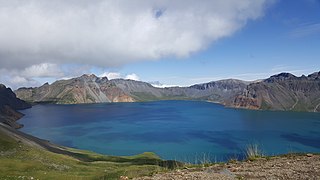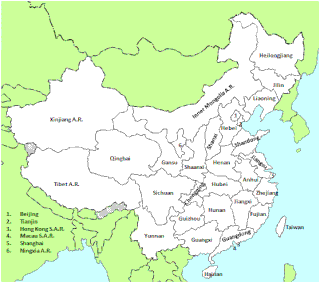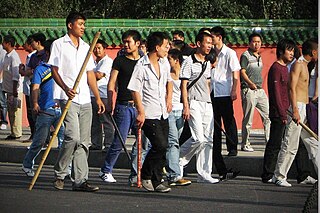Related Research Articles

Jilin is one of the three provinces of Northeast China. Its capital and largest city is Changchun. Jilin borders North Korea and Russia to the east, Heilongjiang to the north, Liaoning to the south, and Inner Mongolia to the west. Along with the rest of Northeast China, Jilin underwent an early period of industrialization. However, Jilin's economy, characterized by heavy industry, has been facing economic difficulties with privatization. This prompted the central government to undertake a campaign called "Revitalize the Northeast". The region contains large deposits of oil shale.

Benxi is a prefecture-level city located in the east of Liaoning province, People's Republic of China, south-southeast of the provincial capital Shenyang. As of the 2020 census, its population was 1,326,018 whom 809,655 lived in the built-up area made of 3 urban districts. It was founded as a metallurgical center in 1915. Benxi Iron and Steel Company (Bengang) is the largest employer in the city, and used to be the fourth-largest steel company in China. The second-largest industry in Benxi is coal mining. The city has pollution problems due to steel production and coal mining.

China Baowu Steel Group Corp., Ltd., commonly known as Baowu, is a state-owned iron and steel company headquartered in the Baosteel Tower in Pudong, Shanghai, China. The company was formed by Baosteel Group absorbing its smaller state-owned peer, Wuhan Iron and Steel Corporation in 2016. It is the world's largest steel producer.

Tonghua is a prefecture-level city in the south of Jilin province, People's Republic of China. It borders North Korea's Chagang Province to the south and southeast, Baishan to the east, Jilin City to the north, Liaoyuan to the northwest, and Liaoning province to the west and southwest. Its population was 1,812,114 registered residents at the 2020 census living in an area of 15,195 square kilometres (5,867 sq mi). Its built-up area made of the two urban districts was home to 446,917 inhabitants. It is known as one of the five medicine production centres in China.

The Pacification of Manchukuo was a Japanese counterinsurgency campaign to suppress any armed resistance to the newly established puppet state of Manchukuo from various anti-Japanese volunteer armies in occupied Manchuria and later the Communist Northeast Anti-Japanese United Army. The operations were carried out by the Imperial Japanese Kwantung Army and the collaborationist forces of the Manchukuo government from March 1932 until 1942, and resulted in a Japanese victory.

Shi Yuejun was a Chinese mass murderer and spree killer known as the "Jilin butcher", who murdered 12 people and wounded five others in Liuhe County and Tonghua County, Jilin Province between 24 September and 29 September 2006. He was sentenced to death on 25 November the same year and executed about a month later.
Events in the year 2008 in China.
The 2008 Weng'an riot was a riot on June 28, 2008, involving tens of thousands of residents in Weng'an County, Qiannan Buyei and Miao Autonomous Prefecture, in the Guizhou province of Southwest China. Rioters smashed government buildings and torched several police cars to protest against an alleged police cover-up of a girl's death.

The Economic Cooperation Framework Agreement (ECFA) is a free trade agreement (FTA) between the governments of the People's Republic of China and the Republic of China, that aims to reduce tariffs and commercial barriers between the two sides, as well as improve cross-strait relations.
The 2009 May Day protests were a series of international protests that took place across Europe, Asia and in the other parts of the world due to the financial crisis of 2007–2008 and the resulting Great Recession. Several May Day marches, which are traditional events, had turned violent in Germany, Turkey and Venezuela as riot police battled protesters in their respective countries. Banks and shops had been attacked in Turkey.
The Shishou Incident was a popular protest and riot in the city of Shishou, Hubei Province, in central China between June 19–21, 2009. The protests were the result of dubious circumstances surrounding the death of 24-year-old chef Tu Yuangao (涂遠高) of the local Yonglong Hotel (永隆大酒店).

The July 2009 Ürümqi riots were a series of violent riots over several days that broke out on 5 July 2009 in Ürümqi, the capital city of the Xinjiang Uyghur Autonomous Region (XUAR), in northwestern China. The first day's rioting, which involved at least 1,000 Uyghurs, began as a protest, but escalated into violent attacks that mainly targeted Han people. A total of 197 people died, most of whom were Han people or non-Muslim minorities, with 1,721 others injured and many vehicles and buildings destroyed. Many Uyghurs disappeared during wide-scale police sweeps in the days following the riots; Human Rights Watch (HRW) documented 43 cases and said figures for real disappearances were likely to be much higher.
The Shaoguan incident was a civil disturbance which took place overnight on 25–26 June 2009 in Guangdong, China. A violent dispute erupted between migrant Uyghurs and Han Chinese workers at a toy factory in Shaoguan as a result of false allegations of the sexual assault of a Han Chinese woman. Groups of Han Chinese set upon Uyghur co-workers, leading to at least two Uyghurs being violently killed by angry Han Chinese men, and some 118 people injured, most of them Uyghurs.
The Economic Cooperation Framework Agreement Television Debate was a televised debate between the President of the Republic of China, Ma Ying-jeou, who is also chairman of the Nationalist Party (Kuomintang), and the chairperson of Democratic Progressive Party, Tsai Ing-wen, which aired on April 25, 2010.
Li Feng was a Chinese teacher who was executed for sexually molesting and raping 19 girls.
The 2011 Chaozhou riot began on the night of Duanwu Festival June 6, 2011 in Guxiang (古巷镇) Chao'an County, Chaozhou, Guangdong, People's Republic of China.
Tonghua Sanyuanpu Airport, also known as Tonghua Liuhe Airport, is a dual-use military and civilian airport serving the city of Tonghua in Jilin Province, China. It is located in the town of Sanyuanpu in Liuhe County, 50 kilometers from the city center. Originally a military airport, construction to convert it for civilian use started in October 2009 with a total investment of 370 million yuan. The airport was opened on 18 June 2014, becoming the fifth civilian airport in Jilin.

Wang Rulin is a Chinese politician and senior regional official. He is serving as Vice-Chairperson of the National People's Congress Agriculture and Rural Affairs Committee. From 2014 to 2016, Wang was the Communist Party Secretary of Shanxi province, where he managed anti-corruption efforts as part of the greater anti-corruption campaign under Xi Jinping. Wang formerly served as Party Secretary (2012–14) and Governor (2009–12) of Jilin province.
Tian Xueren is a former Chinese politician who spent most of his career in Northeast China's Jilin province. He was investigated by the Chinese Communist Party's anti-graft agency in July 2012. He served as Communist Party Secretary and President of Jilin Bank from 2007 to 2012, and Executive Vice Governor of Jilin between 2004 and 2008.
Benxi Steel Group Corp., Ltd. known as Benxi Steel Group is a Chinese holding company based in Benxi, Liaoning Province, for two steel making group.
References
- 1 2 Time.com. "Time.com." How China's Steel Boom Turned Deadly. Retrieved on 2009-07-30.
- 1 2 Etaiwannews.com. "Etaiwannews.com." China police, 30,000 workers clash: rights group. Retrieved on 2009-07-30.
- 1 2 3 4 5 Sina.com. "Sina.com." Finger pointing in steel mill death. Retrieved on 2009-07-30.
- ↑ Yahoo.com. "Yahoo.com." Report: 30,000 China steelworkers in deadly clash. Retrieved on 2009-07-30.
- ↑ Vancouver Sun. "Vancouver Sun." Police clash with 30,000 steel workers in China. Retrieved on 2009-07-30.
- ↑ "Tonghua Iron and Steel Group Chairman An Fengcheng and other vice presidents resign". National Business Daily . 2009-07-29. Archived from the original on 2013-01-01.
- ↑ "Jilin State-owned Assets Supervision and Administration Commission: Tonggang incident is caused by individual encouragement". National Business Daily . 2009-07-28. Archived from the original on 2013-01-01.
- ↑ "Jilin reported Tonggang incident: general manager Chen Guojun was beaten to death". National Business Daily . 2009-07-27. Archived from the original on 2013-01-01.